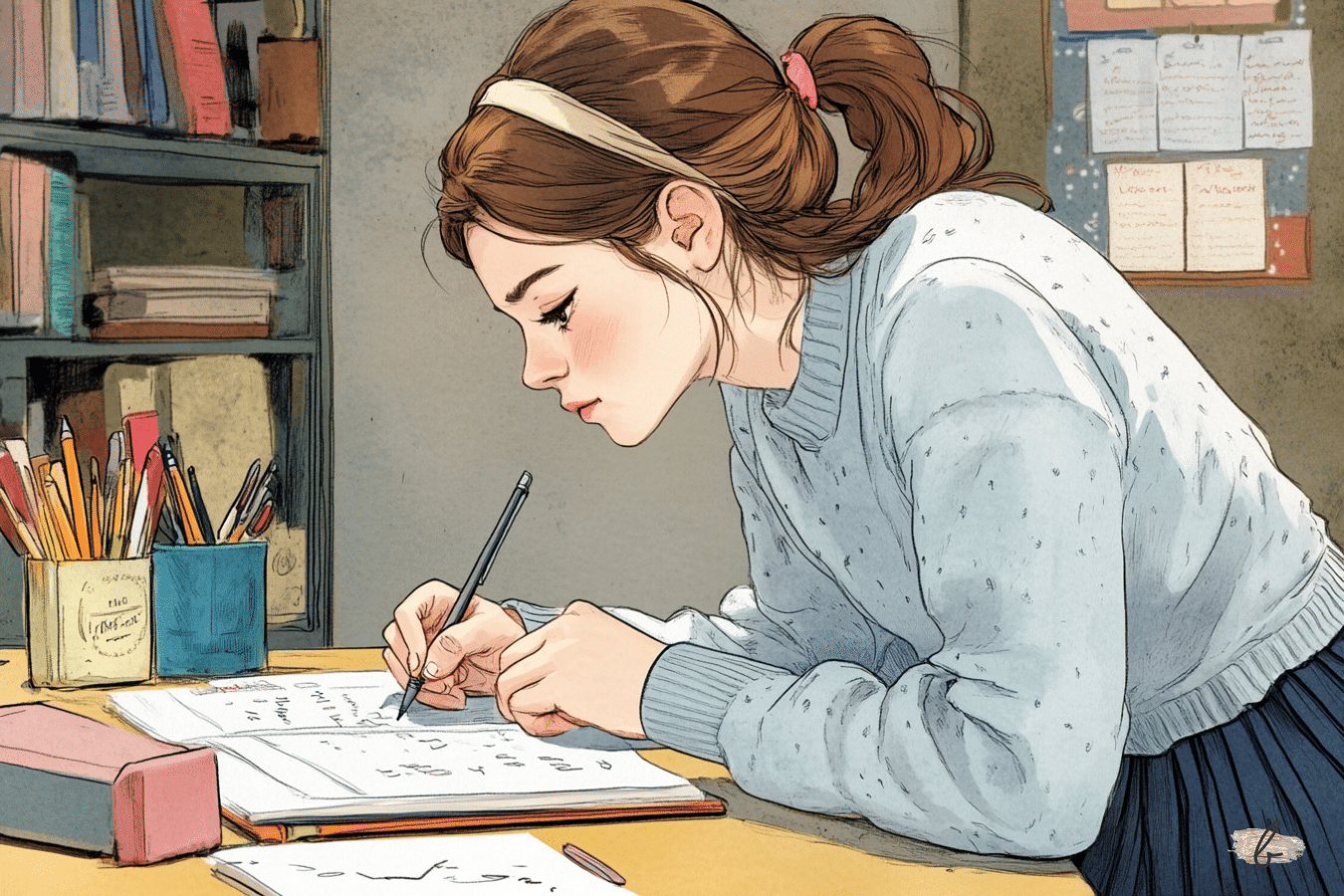The lessons and skills that you gain from the process of studying for Finals goes way beyond mastering the material. (Print this!)
The end of the year is just around the corner, and if you are blessed with older kids, there is something else that comes first: finals!
As I write this, we have begun the studying. When I asked my kids to help with an idea for my article due tomorrow, my eleven-year-old gave me this great idea. She even took a break from her own extensive studying efforts to write down some tips and tricks that work for her. Thank you, Baila, for your help!
Here are our top ten tips to help parents and children of all ages get great marks not only on their tests itself, but also on how they prepared for them.
- Tests are not only about the facts and figures you know and can spit back. There is so much more to our testing, and really to our entire education system than the retention of knowledge, even though that is important too. Here are some of the values and skills you can work on and attain as you navigate exams:
- Trying Your Best: Sometimes, as students, we like to question the value of what we are learning. “When will I ever need to know this in life?” we like to ask. And while there might be good answers to that, one thing is always true: There is always, always value in working toward a goal and putting in our efforts to be the best that we can be in our specific situation. As a student, that means putting in the effort to do well in school. No matter what the subject matter may be, we can pride ourselves on taking it seriously and trying our hardest. On approaching each challenge in life with optimism and with enthusiasm. That is a value we will take with us long after we’ve forgotten the difference between a prokaryotic cell and a eukaryotic cell.
- Integrity: Honesty and integrity are crucial life skills and it’s never too early to work on them. Doing your honest best, without cheating, without faking, and without slacking, earns you 100% in Hashem’s book, every time.
- Helping Others: Are there classmates and friends who can use a study partner? A word of encouragement when they’re nervous? A compliment on their notes, their test-taking skills or their retention of the material? You can practice being a more thoughtful person, worrying not only about yourself and your plan for each test but also looking outward at others who could use your help.
- Planning and Staying Organized: Organizational skills come in handy all life long! Approaching your studying and test taking in an organized and methodical fashion will not only help you do better on the test, but also hone these important skills.
- Sharpening Your Brain: Working your brain properly keeps it healthy and sharp. Knowledge is important, even knowledge you’re not sure you’re ever going to need practically. Taking your studies seriously helps you become smarter and more knowledgeable, and who knows how far that can take you!
- Priority and Perspective: Sometimes we focus too much on studying and ignore everything else important, like helping out at home, being patient and kind, eating, sleeping, etc. Getting one hundred is the most important thing in our life at the moment. And other times, we care too little. We disregard our tests and schoolwork, neglecting our education, showing disrespect for our teachers and school and sometimes even, for our sifrei kodesh chas v’shalom. The sweet spot is the golden middle, where we recognize the importance of what we are doing and also don’t let it take over more than what it should.
- Bitachon and Hishtadlus: Now is a great time to work on that balance of doing hishtadlus and having bitachon that everything is for the best. See number ten for more details!

- Healthy habits help your brain work better. Make sure you are getting a solid night’s sleep before the test—not only the night before, but preferably the entire week. Eating a good breakfast the morning of a test helps you feel invigorated and provides vital nutrients for your brain. When you come into a test sleep-deprived, sugared up and hungry, your brain will be too sluggish to work at optimal levels. Even if you know the material you studied, you may have trouble retrieving that information when you are called upon to do so on the test. You might make careless mistakes, mix up important facts, and do sloppy work. Healthy habits are always important, but especially before a test! Someone I know told me that her family is not always so good about wholesome breakfasts. Mornings are hectic for everyone, after all. They usually grab some cereal or a breakfast bar as they’re running out the door. On the morning of a big test, however, their mother makes them wake up a little earlier and sit down to a healthy breakfast. She cooks eggs to their preference and then makes whole wheat toast. She and her siblings come into a test feeling energized and alert, ready to do their very best.
- Use hints and mnemonics. When you are confronted with stubborn hard-to-remember facts, try to make hints for yourself to help you remember them. I relied a lot on hints during my studying days. In fact, one memorable study session for a high school Ivris final found my friends and me stuck, for some reason, on the word dud, boiler. So we came up with a fantastical story about our uncle (dod) stuck in a boiler room. Not only did we remember it for the test, but I still remember that word—and the hint!—to this day (and I will, of course, not divulge how many years ago that was). Mnemonic devices are techniques we use to sharpen our memory and help us remember information. Here are some different types of mnemonic devices you can employ:
- Acronyms: if you’ve heard of the term mnemonic device, you probably associate it with some famous acronyms and acrostics that have helped students through the ages retain knowledge. For example: Roy G. Biv for the colors of the rainbow (red, orange, yellow, green, blue, indigo, violet) and “Please Excuse My Dear Aunt Sally” (PEMDAS) for the order of operations in math (parentheses, exponents, multiplication, division, addition, subtraction). You can make up your own to remember whatever it is you are studying for.
- Hints and Associations. Much like my story with the dud, find ways to connect the concepts you are trying to remember with concepts that are familiar to you. The hints can be as far out and silly as you want them to be. They hardly even have to make sense, as long as they plant that association in your mind. (The Jacobses live at 147. Yaakov lived 147 years. Prince Edward Island is the smallest province in Canada. Because a prince is smaller than a king. Or PEI—like pee-wee. Or Edward—a dwarf.)

- Songs. There is a reason why we learn so many songs in school. Singing something is a very helpful way to remember it. I know all my presidents because I remember the song we learned with the presidents back in fourth grade or so. I don’t know states or capitals because we didn’t have a song for that. My children do, because they do have a song. If you are memorizing information, try putting it to a familiar and catchy tune. You are likely to remember that information long after you finish taking the test.
- Take it outdoors. I’ve always enjoyed studying while taking a walk. I’m not sure if it’s the exercise that gets our brains all fired up, the fresh (and at this time of year cold!) air, the quiet evening stillness, or simply the change in scenery; there is something about taking a walk down the block as you study that really helps. I did it with my own high school friends, and now I’m doing it with my children. I have good memories of holding pages of notes in tiny handwriting up to the streetlight to make out what I wrote.

- Have fun! You will have an easier time studying if you enjoy the process. Turn on your favorite music if that helps you concentrate. (Some people might find it too distracting!) Line up your favorite snacks. Play games while you study. For example, jump rope as you chant your material. Throw a ball into a net every time you get an answer right. Make up your own fun and interesting games. Invite friends over for a study party—just make sure you actually study!
- Spread out the studying. When you are organized with your studying, you increase your chance of success. Cramming all of the information in the night before (or morning of!) a test is a surefire way to forget a lot of information and cause you unnecessary anxiety and stress. (My own study buddies are probably laughing at this because I must admit I was a notorious crammer, but that doesn’t mean I can’t warn you, dear readers, not to be like me!) As soon as you find out about a test, especially a test with a lot of information on it, like a final, figure out how many days you have until the test. Then, divide the material you are responsible for by the number of days and study that material every night. So if you have a week until your test on ten chapters of science, study two chapters a night. Save the last night to review everything you’ve studied. Then, break down all of the information you have trouble remembering into flashcards. Take those flashcards with you wherever you go and look them over whenever you have a chance. On the bus, at a family simchah the night before, during recess before the test. It’s overwhelming to do that last review when you have all of your notes and don’t know where to start, but if you have just a few flashcards that are easy to pull out, you are much more likely to make wise use of those few minutes here and there. (Not that I am advocating studying during a family simchah, but if you need to or would be doing so anyway, do it with flashcards, not with notes!) An added benefit is that the act of writing something down helps you remember it, so even if you never touch those flashcards, just writing them alone is beneficial.

- Motivate yourself: It can be hard, studying night after night for test after test. If the studying is hard for you, it can be especially frustrating and demoralizing. Keep yourself moving and motivated by treating yourself every once in a while. You can do this in a number of ways. Set aside some small candies and reward yourself with one for every answer you get right on your review. You can also think of an activity you’d like to do, a treat you’d like to indulge in, or even an opportunity to stretch your legs, and allow yourself that after a certain chunk of time or material. “After each chapter, I will get a scoop of ice cream.” “Every half hour, I will take a walk around the block.” “Every ten dates we both memorize, we will play one game of Battleship.”
- Believe in yourself. There is a famous quote that goes, “Whether you think you can, or you think you can’t, you are right.” When we believe in ourselves and we convince ourselves that we can ace this, the results will be in our favor. This also helps us come into a test, or even simply a study session, with confidence and alacrity. When you tell yourself, “I’m never going to know this,” usually, the next question is one that you will indeed not be able to answer. The thought that you are going to fail prevents you from putting in your best effort, because, after all, what is the point? You are going to fail anyway. Giving up means you never know how much you really could have accomplished. Go in with confidence and faith, and don’t be too nervous or stressed. Many a point has been lost and many pieces of information forgotten simply from nervousness.
- Don’t be afraid to ask for modification. Parents, it’s important for our children to believe in themselves, but we have to give them goals that are attainable. Students do not possess equal academic ability, and usually the students who struggle the most also don’t have the capacity to study for the increased amount of hours they would need to do well. Hopefully your school and teachers are accommodating and understanding of differing abilities and will be happy to accommodate if your child needs modification of the material or the actual test. Reach out and explain what you know about your child, because no one knows her better than you! Even non-academic students can enjoy and gain from their school years; we just have to make sure not to break them in the process. We want them to come out with their self-esteem and their love for learning and Yiddishkeit intact, even if they don’t remember all of the elements of the periodic table.
- Trust in Hashem and daven! I saved the most important one for last. We study and study for our tests because that is appropriate hishtadlus, but we have to remember that our marks, like everything else, are up to Hashem. When we go into a test satisfied that we have done our best and put our faith in Hashem for the rest, we shed so much of the stress and anxiety often associated with tests. And of course, we can’t forget the most important hishtadlus of all: daven! Daven that the test should be a positive experience, that you should do well, your friends should do well, your classmates should do well and anything else you want to ask Him.
I will end off with a cute and sweet true story: There was a high school girl here in Lakewood who used to wear several plastic bracelets. Whenever the class would have a test, she would give out her bracelets to different girls to wear. It was on a first-come-first-serve basis, but she made sure that anyone who wanted received a chance at some point. They would kid around about her “good luck charm” and it became a class joke. Not always, but often, the girls who got to wear the bracelet on test day reported that they did better than expected, or simply did well, on the test. This intensified the “good luck charm” joke. One day, the girl revealed her secret: Whenever she gave out her bracelet, she wrote down the names of all of the girls who wore one that day. When she davened for her own hatzlachah, she would keep those girls in mind as well.
Wishing all our students much hatzlachah on their tests, on paper and in life, now and always!
Originally appeared in The Lakewood Shopper





Leave a Reply